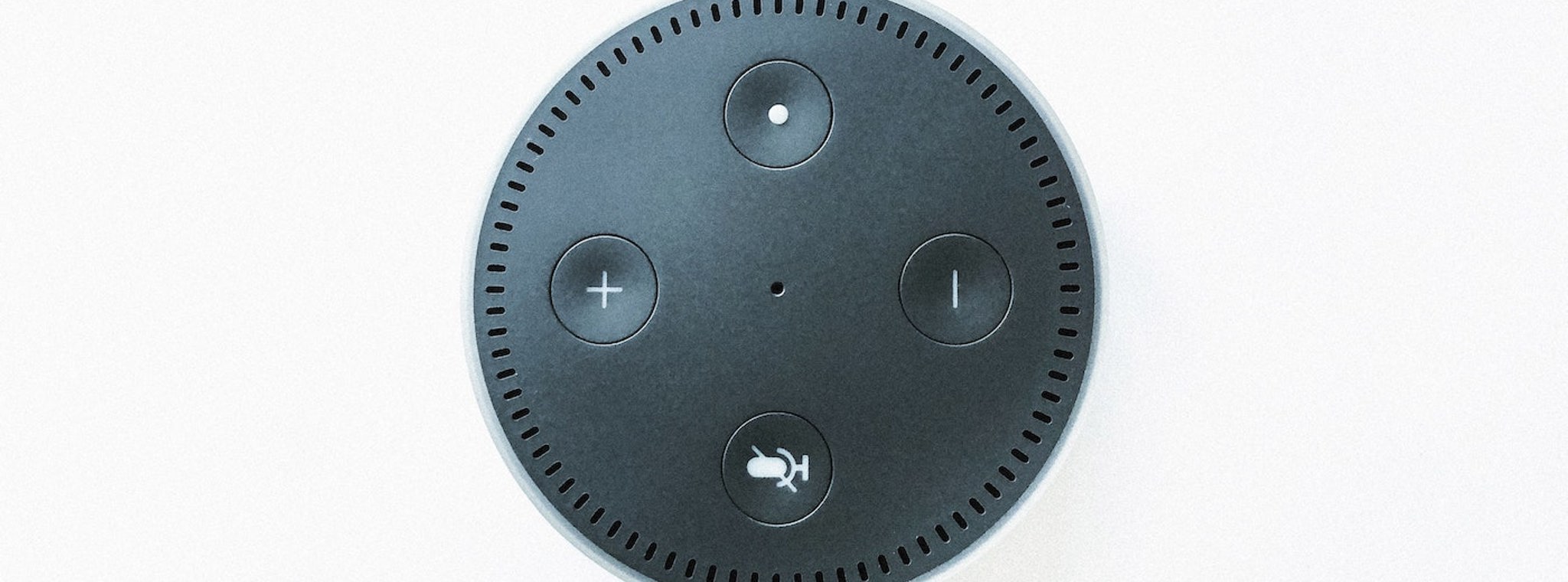“Alexa – What's the future for voice search?”
Intro
We were way behind the curve in our household when it came to voice-activated smart speakers and Alexa was only recently invited into our home after I succumbed to the temptation of an Amazon Black Friday offer. I’ve now, albeit belatedly, joined one of the 6.6 million people in the UK who own a smart-speaker – using it to set timers to avoid burning the tea whilst playing my favourite tunes or, more often than not, a completely random song when Alexa mishears my request.
How does voice search work?
There are currently four major smart speakers or voice-enabled assistants available in the UK: Amazon’s Alexa, Apple’s Siri, Microsoft’s Cortana and Google Assistant. Connected to the internet, they work by using voice recognition technology to understand what is being said before acting upon the request. Typically, the smart speaker listens to all speech and awaits a “wake word”. Once the speaker hears this word it activates, records what is being said and then relays this over the Internet to the voice recognition service in the cloud. The voice recognition service deciphers the speech and then sends a response back to the smart speaker. The software uses algorithms to become more familiar with speech patterns and attempts to learn as it goes, so each new request you make is more likely to be understood. My Alexa is still definitely in the learning phase as I was forced to listen to 30 seconds of Westlife instead of Amy Winehouse yesterday!
It is estimated that global smart speaker sales will surpass $30 billion by 2024 and that the UK voice commerce market alone is expected to be worth £3.5 billion by 2022. Interestingly, the uptake of smart speakers isn’t being fuelled solely by the younger generation of digital natives.
A survey by PWC USA in February 2018 showed that although the youngest consumers they surveyed (18-24-year-olds) are adopting voice technology at a faster rate than their older counterparts, they are statistically more likely to use their voice assistants less. The heavy users are more likely to be the 25-49-year-olds. Many forecasts are also predicting an upsurge in usage by the older generation who, once they have been set up, will find smart speakers much easier to use than smartphones.
What does voice search mean for your business?
Voice technology is dramatically impacting how consumers engage with businesses. I have read a report by Gartner which claims that by the end of 2020 over 30% of web browsing will be screenless. Of course, this will affect some types of business much more than others. Local businesses such as restaurants, shops, food delivery, hotels, garages, and vets etc. are set to be most heavily impacted as over 46% of voice search is used to look for a local service.
If, like me, you work in marketing or if you are responsible for promoting your own business, the impact of voice search adds a whole new dimension to your Search Engine Optimisation (SEO). Screen-free searches deliver one solitary result rather than a page of 10 or more results to scroll through so being the one at the top matters more than ever.
Voice searches are longer than traditional text search and use more natural language so you will need to optimise your web content for long-tail keywords (a specific keyword phrase usually 3 or 4 words) and queries which are spoken aloud. You now need to consider not only what questions your customers will be asking but also how, when and where they are asking them.
Optimising your website for voice search is a subject that requires an in-depth article all of its own (watch this space!) but if you are interested in SEO, I recommend reading a report by a company called Backlinko who recently analysed over 10,000 Google Home search results to answer that very question “How do you optimise your site for voice search?”. Their report highlights that Google prefers actual voice search results that are very brief and to the point (the average voice search result is only 29 words long), and that site loading speed is crucial in voice search SEO. The average voice search result page loads in 4.6 seconds (52% faster than the average page).
The not to distant future
In what would have previously been considered only in the realms of science fiction, earlier this year Amazon issued a patent that would allow Alexa to decipher a user’s physical characteristics and emotional state based on their voice. If Alexa can understand how you are feeling – happy, bored, angry, stressed etc. the device will be able to read your emotions and personalise the response. Amazon has also patented a version of Alexa that can automatically tell when a person is, “cough”, ill and, “cough”, offer to sell them medicine from their voice alone. Health is currently a major theme with Amazon who have also teamed up with the NHS to support elderly and visually impaired people who cannot easily access health advice on the internet.
Google and Amazon are fighting it out for market share, with Amazon currently the dominant force in the market – accounting for more than a third of all sales this year in last quarter’s sales figures. However, Amazon’s biggest drawback is that Alexa is effectively housebound whilst Google Assistant and Siri can accompany us everywhere as they are on our phones. In September, Amazon revealed their latest James Bond-like gadgets featuring voice search – Echo Frames Smart Glasses for your eyes and Echo Buds for your ears. Even weirder is the new Echo Loop Ring which allows you to discretely whisper a question to Alexa and you can then listen to the answer whilst pretending to scratch your ear. It gives a whole new meaning to “Talk to the Hand” and if you are wearing the glasses, the face is listening!
As we start a new year, our newsfeeds will be filling up with the top 10 technology predictions for 2020 and I predict that voice search will feature heavily. I also predict that Alexa will fit into our house very well, as like my teenage children, she is already quite good at pretending she hasn’t heard me when I ask her to do something!
More info
Visit Jim's professional bio

